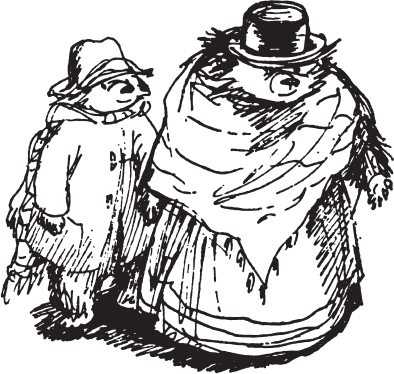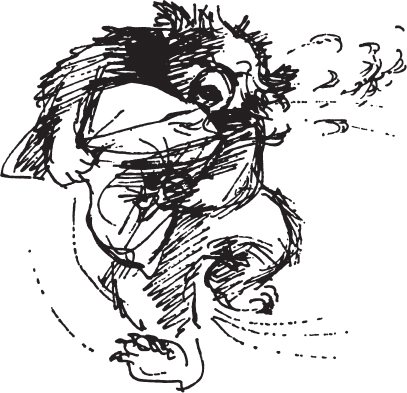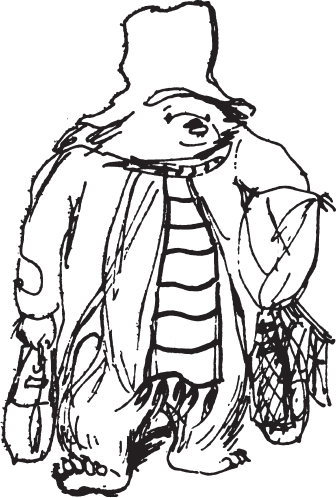“Good heavens!” exclaimed Mr. Brown, as he opened the post at breakfast one morning. “Fancy that!”
“Fancy what, Henry?” enquired Mrs. Brown.
Mr. Brown held up a short, handwritten note for everyone to see. “We’ve been invited to a rugby match,” he replied.
Mr. Brown’s announcement had a mixed reception from the rest of the family. Mrs. Brown looked as if she didn’t fancy the idea at all. Jonathan and Judy, who were enjoying the first day of their Christmas holiday, obviously fell in opposing camps. Mrs. Bird passed no comment, and it was left to Paddington to sway the balance.
“A rugby match!” he exclaimed excitedly. “I don’t think I’ve ever been to one of those before, Mr. Brown.”
“Well, it’s really through you we’ve been asked at all,” said Mr. Brown, as he reread the note. “It’s from the headmaster of your old school. It seems they’re having an end-of-term game in aid of charity. It’s between the sixth form and a touring side from South America—the Peruvian Reserves. I expect that’s why they thought of you.”
“I didn’t even know they played rugby in Peru,” said Mrs. Brown.
“Well, there must be at least twenty-six of them,” said Mr. Brown, “if they’ve managed to send over their reserves.”
“You can borrow one of my old rattles if you like,” said Jonathan.
“It had better be one that works both ways,” broke in Judy. “Don’t forget, Paddington’s loyalties are going to be divided.”
Paddington jumped up from the table clutching a half-eaten slice of toast and marmalade in his paw. “My loyalties are going to be divided!” he exclaimed in alarm.
“Well,” said Judy, “you won’t know which side to cheer. After all, it is your old school, and you do come from Darkest Peru.”
Paddington sat down again. “Perhaps I’d better have two rattles,” he said. “Just to be on the safe side.”
“Don’t you think a couple of flags might be better?” said Mrs. Brown nervously.
“Small ones,” agreed Mrs. Bird. “We don’t want any eyes poked out in the excitement. You know what rugby crowds are like, and there’s no knowing what might happen once that young bear gets worked up.”
With the memory of other sporting functions Paddington had attended still clear in her mind, the Browns’ housekeeper was beginning to wish she’d taken a firmer stand at the start of the conversation.
But it was too late. Paddington was already helping Mr. Brown compose a letter of thanks to the headmaster, and as soon as breakfast was over he made preparations to go down to the market in order to see his friend, Mr. Gruber.
Paddington had sometimes seen rugby being played on television, but it had always looked rather complicated and he’d lost interest after a moment or two. Going to see a real game, particularly one involving his country of birth and his old school, was quite a different matter, and he decided he ought to know something more about the game. Paddington felt sure that among his many books Mr. Gruber would have something on the subject, and as usual he wasn’t disappointed.
After a few minutes’ search his friend came up with one entitled RUGBY—ALL YOU NEED TO KNOW FOR A POUND, which seemed very good value indeed.
But Mr. Gruber waved aside both Paddington’s money and his thanks. “I’ve had that book for more years than I care to remember, Mr. Brown,” he said, “and if it helps you out then I shall be more than pleased.”
As Paddington got ready to leave, Mr. Gruber announced that he would be closing his shop the following afternoon so that he, too, could go and watch the match. “I’ll probably see you in the stand, Mr. Brown,” he said.
Paddington looked rather embarrassed. “I think we shall be sitting down, Mr. Gruber,” he said. “Mrs. Bird told me I would have to wrap up well and to take a cushion because the seats are very hard.”
Mr. Gruber laughed. “When you go to a rugby match, Mr. Brown,” he said, “they call the places where you sit ‘stands.’ I’m afraid it’s rather like the game itself—it’s a bit difficult to explain.”
As he took in this piece of news, Paddington felt more pleased than ever that he’d managed to get hold of a book on the subject, and he hurried home to study it.
After a quick lunchtime snack, he wasn’t seen again for the rest of the afternoon, but if the sounds emerging from his bedroom were anything to go by it was obvious that he was getting a good deal of value out of Mr. Gruber’s book. Some of the bangs and thumps were very loud indeed, and they were punctuated every now and then by piercing blasts from a whistle and a noise which sounded not unlike that of crunching gears.
“Thank goodness the Peruvians haven’t sent over a team of bears!” exclaimed Mrs. Bird, voicing everyone’s thoughts as Paddington’s rattles rent the air for the umpteenth time. “If it sounds like that now, goodness only knows what it’ll be like on the day.”
When Paddington eventually came downstairs again his forehead looked suspiciously damp and there were several pillow feathers sticking to his fur. He had reached a particularly interesting section of his book called TACKLES—AND HOW TO DO THEM, and for the remainder of that day the Browns gave him a wide berth, especially as he kept casting thoughtful glances at their ankles whenever they went past.
Paddington slept well that night. In fact, after all his exertions he overslept, and when he eventually came down, he was already dressed for the afternoon’s match. Remembering Mrs. Bird’s warnings, he was wearing not only his duffle coat and hat, but two enormous scarves into the bargain; a blue one in honor of the Peruvian side, and a red one in the school colors.
Apart from that, he was also carrying a large cushion, his suitcase, two rattles, a flag, a thermos of hot cocoa, and a pile of marmalade sandwiches—several of which he ate in order to pass the time while he was waiting to go.
Because of the importance of the occasion, the school had taken over a small stadium next to their grounds, and when the Browns left the house a sizeable crowd was already beginning to make its way there.
Catching sight of some of his friends from the market, Paddington began to wave his flag, and by the time they joined Mr. Gruber in the stand and the moment for kickoff drew near, even Mrs. Brown and Mrs. Bird began to be infected by the general air of excitement.
Mindful of the nearness of Paddington’s rattles, Mrs. Bird handed round some pieces of cotton wool for their ears, and as the two teams trotted out onto the field they all settled back to enjoy themselves.
Paddington decided to keep one rattle in his right paw for St. Luke’s, who were at the far end of the field, and the other one in his left paw for the visiting team.
At first there was very little to choose between the two, but gradually the amount of noise issuing from his left paw grew less and less until eventually it petered out altogether.
It was clear from the start that, good though they were, the visiting side were no match for Paddington’s old school. The sixth form towered above their opponents and no matter how they tried, the Peruvian forwards couldn’t penetrate their defenses. In fact, the only good thing about it all was that for the most part, play took place at the end of the field where the Browns were sitting, so that Paddington had a good view of the game.
Despite reading Mr. Gruber’s book, he was hard put to follow what was going on. As far as he could make out, as soon as anyone picked up the ball, the referee blew the whistle and they had to put it down again, after which most of the players formed up in a circle with their heads together as if they were having some kind of discussion.
Paddington grew more and more upset as the game progressed, and when, towards the end of the first half, one of the Peruvian players was sent off the field for what seemed like no reason at all, he looked very unhappy indeed. Far from being divided, his loyalties were now almost completely on the side of the visitors.
“I’m afraid he’s been sent off because he’s got what they call a ‘loose arm,’” explained Mr. Gruber, when he saw the look on Paddington’s face.
Paddington gave the referee a hard stare. “I’m not surprised!” he exclaimed.
In his letter to the Browns the headmaster had said the match was to be a friendly one, but from where Paddington was sitting it looked as if the game was getting rougher with every passing moment. The way the Peruvians kept getting thrown to the ground, he wouldn’t have been surprised if some of them had been sent off with loose legs as well.
During the interval Mr. Gruber explained that having a loose arm simply meant the player in question hadn’t been holding on to the man next to him in the scrum, and that he’d been sent off because he’d been guilty of the offense more than once.
“A scrum,” said Mr. Gruber, “is when the players form up into a group with their arms round each other in order to restart the game. It’s very important to have it properly conducted.”
Mr. Gruber went on to list the various reasons for stopping and starting the game, but Paddington’s mind was far away; and when, just after the middle of the second half, yet another of the Peruvian players retired hurt, he could scarcely contain his indignation.
Mr. Brown glanced at his program. “That’s hard luck,” he said. “They’re only allowed two substitutes and it seems they still have several players on the injured list from the last game. That means they’ll be one short for the rest of the match!”
“Crikey!” said Jonathan. “They’re eight points down already. They don’t stand a chance.”
He looked round in order to sympathize with Paddington, but to his surprise the space next to Mr. Gruber was empty.
“I think young Mr. Brown is taking things rather to heart,” said Mr. Gruber. “He’s gone off somewhere.”
“Oh dear,” said Mrs. Brown nervously. “I do hope he doesn’t get lost in the crowd.”
The words were hardly out of her mouth when Judy jumped up from her seat with excitement. “Look!” she cried, pointing towards the field. “There he is!”
Following the direction of her gaze, the Browns saw a familiar figure in a duffle coat and hat hurrying across the pitch.
“Oh, gosh!” groaned Jonathan. “Trust Paddington.”
The match was being refereed by the St. Luke’s Games teacher, and he’d been about to blow his whistle to restart it when something about the way the crowd was cheering made him pause. He turned and stared at the approaching figure in surprise.
“Excuse me,” said Paddington, “but I’ve come to offer my services. I’d like to join the Peruvian Reserves, please.”
The Games teacher looked at him uneasily. Although he hadn’t actually met Paddington before, he knew all about him from the other teachers.
“I’m very sorry,” he said, “but I don’t think I can allow that. It really has to be someone from the country concerned.”
“I come from Peru,” said Paddington firmly. “Darkest Peru. And I’m very concerned.”
“It’s true, sir,” broke in the school captain. “I’m sure the Head wouldn’t mind.”
The Games teacher ran his fingers round his collar. “It’s all highly irregular,” he said. “I’m really supposed to know the names of any substitutes before the match, but . . .” he looked round nervously as sounds of unrest came from the crowd, “it is in aid of charity, and . . . er . . . if no one objects . . .”
“We certainly don’t,” said the St. Luke’s captain sportingly.
“All right,” said the Games teacher, turning to Paddington. “I’ll hold up play for a moment while you get rid of your duffle coat.”
“Get rid of my duffle coat!” exclaimed Paddington hotly. He gave the teacher a hard stare. “I’m afraid I can’t do that. Mrs. Bird said I had to wrap up well.”
The Games teacher gave a sigh. He knew he was fighting a losing battle. “Perhaps,” he said, as the other players gathered round, “you’d better meet the rest of your side.”
“You are good at rugby, no?” asked the Peruvian captain as he shook Paddington’s paw while he introduced the other members of his team.
“Well, no,” agreed Paddington. “You see, I haven’t actually played before. But I’ve read all about it in a book Mr. Gruber lent me, and I practiced some tackles in my bedroom yesterday with one of my pillows.”
Fortunately the visiting team’s command of English wasn’t quite up to Paddington’s explanations, otherwise they might not have greeted the arrival of their new teammate with quite so much enthusiasm.
In any case, there was no time to dwell on the matter, for with the crowd beginning to stamp and whistle at the long delay, the players quickly formed up again and waited for the referee to blow his whistle.
Paddington watched as they formed a scrum and one of the St. Luke’s team threw the ball into the tunnel formed by their legs.
There was a flurry of movement and almost immediately the ball came flying out again and, as luck would have it, landed right at his feet.
Paddington raised his hat politely to thank the player who had thrown it, and then picked the ball up in order to examine it more closely. He’d never actually seen one close to before and he hadn’t expected it to be quite so oval in shape. He was just wondering if he ought to tell the referee in case it had been squashed with all the rough play, when there was a pounding of feet from somewhere behind and what seemed like a ton weight suddenly landed on top of him.
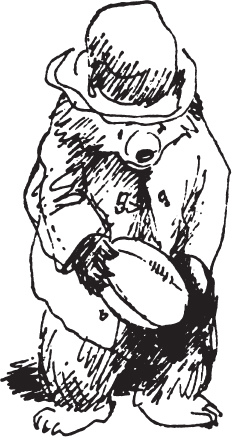
For a moment, Paddington lay where he had fallen, all the breath knocked from his body, and with a hard lump in the middle of his chest which, as he came to, he gradually realized came about because he was still clutching the ball.
“Very good,” said the Peruvian captain as he helped Paddington to his feet. “We have gained two meters. Only eighty more to go. Now we have another scrum.”
“Another one!” exclaimed Paddington in alarm. He began to move back in case the same thing happened again; but before he had time to get very far, let alone regain his second wind, the game was in full swing once more, and one of the Peruvian forwards was already racing full pelt towards him.
“Catch!” he shouted, throwing the ball to Paddington.
“I don’t want it, thank you very much,” cried Paddington, and as the ball landed in his paws he threw it up the field as hard as he could.
Almost immediately, the referee blew his whistle.
“You’re not supposed to throw it forwards,” he said. “You’re supposed to throw it back down the field.”
Paddington stared at him in astonishment. If that was the sort of rule the Peruvians were up against, it was no wonder they were losing.
“Perhaps,” said the captain, as the players formed up again, “you would like to be our ‘hooker’?”
“That’s the chap who has to try and get the ball when it’s thrown into the scrum,” explained one of the St. Luke’s side, catching sight of the puzzled look on Paddington’s face.
Paddington eyed the other players doubtfully. He didn’t like the way some of them were looking at him at all. All the same, he was a game bear at heart, and after a moment’s hesitation he joined in the scrum and waited for the ball to arrive.
To his surprise it landed somewhere in the middle of the legs and then bounced straight back into his paws.
Hastily putting it inside his duffle coat for safety, he broke free of the scrum and hurried off down the field as fast as his legs would carry him. As he neared the far end he took a quick glance over his shoulder, but the rest of the players seemed to be having some sort of an argument with the referee, and no one except the crowd was taking the slightest interest in his activities.
The roar which went up as Paddington placed the ball on the outer side of the touchline completely drowned the cries from the other players when they discovered what had happened. But, jumping with joy, the Peruvian side came running down the field in order to pat Paddington on the back.
“Is a very good try,” said the captain. “Is a best try I never seen.
“Now,” he added dramatically, “all you ’ave to do ees improve it and we are ’aving five points.”
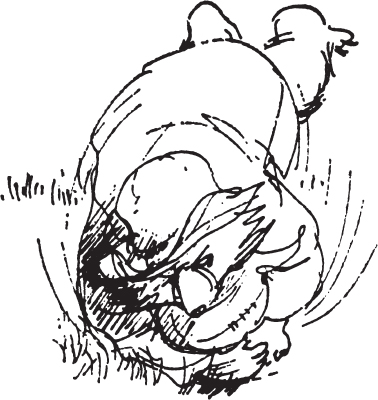
“I don’t think I could improve it,” gasped Paddington. “I don’t think I could run any faster if I tried.”
The Games teacher took a deep breath. He still couldn’t understand how Paddington had managed to escape his and the other players’ notice, but seeing was believing.
“He doesn’t mean he wants you to do it all again,” he said wearily. “He means you’ve scored three points for placing the ball over the line. Now, if you manage to kick the ball between the posts and over the cross bar you get two more points. That’s what’s known as ‘improving’ it.”
Paddington gazed up at the goal posts while he considered the matter.
“I think I like it the way it is,” he announced.
“In that case,” said the captain, “I will call on Fernando.”
Signaling to one of the other members of the team he stood back with the rest of the players and waited expectantly.
“Hooray!” shouted Jonathan, as there was the sound of leather hitting leather and the ball sailed between the posts. “Five points to Peru!”
“Darkest Peru!” added Judy.
But their voices were lost amid the renewed cheers which rose from all around at the unexpected turn of events.
“Do you think they’ll do it again?” asked Judy anxiously as the two teams ran back up the field amid a buzz of excitement.
Mr. Brown glanced at his watch. “They’ll have to look slippy,” he said. “We’re into extra time already.”
Although none of the Peruvian side knew how Paddington had managed to fool their opponents, they knew better than to change their luck once it was running their way, and they made sure he was given possession of the ball as soon as it was in play.
Once again, with it safely tucked beneath his duffle coat, he hurried back down the field.
But this time the other side had him marked, and with one half of the team protesting to the referee as they realized what was happening, the rest set off in hot pursuit. Like hounds who had caught the scent of a fox, they gave chase, uttering whoops of revenge.
Paddington ran as fast as he could, but size for size his legs were no match for the sixth formers of St. Luke’s, and they were gaining on him rapidly.
To roars of encouragement from the crowd, he reached the line barely a whisker’s length ahead, and with no time to look over his shoulder let alone stop to put the ball on the ground, he tore on for all he was worth.
He was dimly aware of a figure approaching him across the turf. Whoever it was had come from the crowd behind the goal area and was waving at his pursuers. He only just managed to pull up in time before they collided. As it was, they both fell to the ground, and any remarks they might have exchanged were lost for all time.
At almost the same moment, a long drawn-out blast from the referee’s whistle brought both the St. Luke’s forwards and the game to a halt.
“What rotten luck!” exclaimed Jonathan. “Fancy getting in the way just as Paddington was about to save the game!”
“Rotten luck, nothing!” said Mr. Brown, waving his program in the air. “That’s one of the rules of the game. You don’t have to touch the ground. You can score a try by touching a spectator or an official provided they’re not more than ten meters beyond the goal.”
“That means they’ve drawn, then!” cried Judy excitedly. “Listen to everyone cheering.”
“I’m not surprised,” said Mr. Brown. “Whatever the rights and wrongs of the matter, I think the crowd’s had its money’s worth. I doubt if they’ll see a better game this season.”
“Hear! Hear!” agreed Mr. Gruber. “And I think a draw is a very fair result in the circumstances.” He broke off as he suddenly caught sight of a strange expression on Mrs. Bird’s face. “Is anything the matter?” he asked with concern.
“I’m not sure,” said the Browns’ housekeeper faintly. “I’m really not sure at all. Will someone please tell me if I’m seeing things?”
As the others turned, they too caught their breath in surprise as they saw Paddington heading in their direction accompanied by his helper from the crowd.
She wore an odd-looking bowler hat and a poncho which was more than a little mud-stained and ruffled, but there was something very familiar about her nevertheless.
“Excuse me,” said Paddington as they drew near, “but I’d like to introduce you to my Aunt Lucy!”
